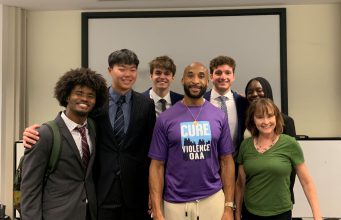
Millennial workers now total 56 million, representing 35% of the total US labor force. How can organizations harness their unique talents and strengths? Goizueta’s Andrea Hershatter, senior lecturer of Organization & Management and senior associate dean of the BBA program, joins The Goizueta Effect podcast to explore this generation’s use of technology as a “sixth sense,” their inherent trust in organizations, and their tendency toward an extrinsic sense of fulfillment.
The following is a brief excerpt of Hershatter’s insight about the millennial generation, named for the high school class of 2000, in conversation with Goizueta Director of Communications, Melanie Buckmaster. Each generation, Hershatter explains, accounts for approximately 15 years. Millennials “were absolutely raised as the next great generation,” she says of the generation that shoulders heavy societal burdens.
MB: In your research, you discuss millennials using technology as a sixth sense. Can you talk about the context in which millennials grew up with technology and how this has impacted how they socialize and work?

AH: Absolutely. This is a hot button for Gen X, as it should be. Gen X invented this technology. So, to call millennials the experts and the digital natives and to disregard the fact that they are utilizing tools that they themselves did not develop is a point of contention. But for millennials, technology was embedded into their earliest ways of knowing. It really is a sixth sense. And one of the things about something that’s a sense as opposed to an intellectual endeavor is that it is noncognitive.
A millennial would never think of the technological aspect or the technological solution to something. It would simply be a part of how they approached a problem. It is also the case that because it’s a sense, millennials do something that people like me occasionally find annoying where they are utilizing a piece of technology while they’re interacting with you in the real world. I have to remind myself that just like I might scribble on a piece of paper or look out a window while I’m very fully engaged in conversation, so, too, a millennial might look down at their phone and answer a friend’s text. And they are capable of that multitasking in a way that I know I personally am not.
In terms of how it influences the workforce, which I think is super important, I would say that there are probably two aspects. There are the ways that technology is important in how millennials work. And then there’s the way the technology has to do with reaching the customers and consumers of whatever the product or services a firm is providing.

So, in terms of the workforce itself, I think that millennials feel very free to use the technology that suits the task at hand. It Influences, for example, how they communicate. I personally have written very carefully crafted emails with lots of words that take me half an hour that end with, “And so I think we should meet to discuss this.” And I will get back the one letter response from the person to whom I have sent it, which is “K”. Which is basically a polite way of saying, “You could have just texted me and said, let’s get together. Right? Because we’re going to talk about this anyway.” This is one of the examples of the reach of technology and the importance of understanding which mode fits the message and the intention.
Are you a millennial entering the workforce, or are you a manager of an employee from this generation? Learn more about millennials in the workplace, including their strengths, shortcomings, and how they show up as workers and leaders. Listen to the full podcast and more episodes with other distinguished faculty members at The Goizueta Effect.











